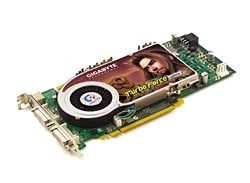Gigabyte, EVGA, BFG release higher-powered GeForce graphics cards
Chicago (IL) - If the standard GeForce 6800 and 7800 just don't deliver enough horsepower for your games, then EVGA and Gigabyte may just have what you are looking for. EVGA announced the first 512 MByte 6800 GT, Gigabyte introduced an overclocked 7800 GTX version and BFG launched water-cooled versions of the 7800 GT and 7800 GTX.
An extra MHz for a graphics processor may be as insignificant for many users as is for daily car drivers to gain that extra millisecond in a quarter mile run. But in the gaming world, especially in multiplayer environments and LAN parties, that extra bit of performance can provide decisive advantages. More and more graphics cards manufacturers react to this growing need from the gaming community and offer products with specifications that go beyond standard Nvidia boards.

Most interestingly, however, is the price of the card. With $380, the board is not cheap by any means, but less than $400 sounds much more reasonable than the $1000 and more for the 512 MByte 6800 Ultras we have seen earlier this year.
Gigabyte is a fairly new candidate in the overclocking field and today released a beefed up version of its 7800 GTX card. The new card, named "GV-NX78X256VP-B" and much more recognizable through the add-on "TurboForce Edition", increases the standard core clock from 430 to 480 MHz and the memory clock from a standard 1200 MHz to 1250 MHz. The company claims that users will see a significant increase in performance: 2003 3DMarks are indicated from about 16100 to close to 17300, the 2005 version will see a jump from about 7680 to 8300 points, Gigabyte said.
If 480 MHz is not enough, BFG offers a water-cooled 7800 GTX with a core clock of 490 MHz and a memory clock of 1300 MHz. A regular overclocked GTX is available in a 460 MHz/1300 MHz version. There is also a water-cooled 7800 GT, which comes with a core clock of 470 MHz and 1050 MHz memory clock instead of the 400 MHz/1000 MHz of a standard spec card.
Stay on the Cutting Edge
Join the experts who read Tom's Hardware for the inside track on enthusiast PC tech news — and have for over 25 years. We'll send breaking news and in-depth reviews of CPUs, GPUs, AI, maker hardware and more straight to your inbox.
Most Popular


